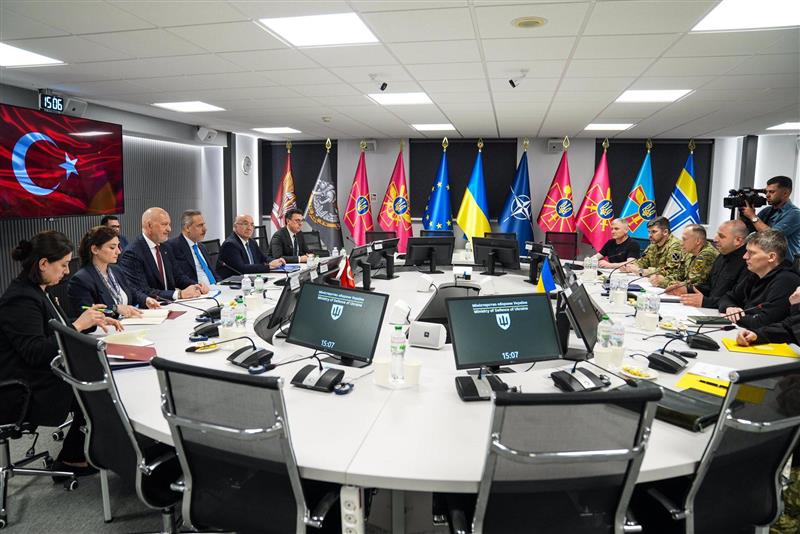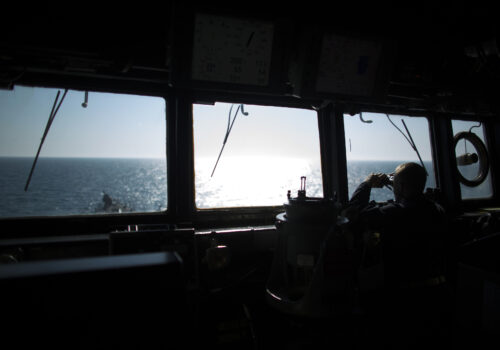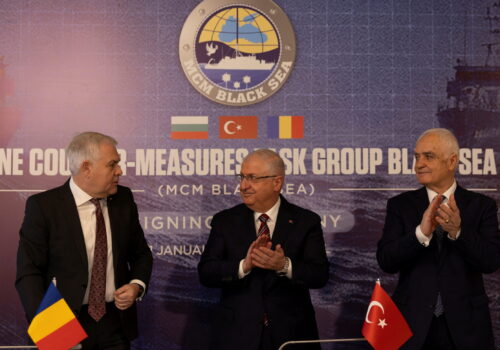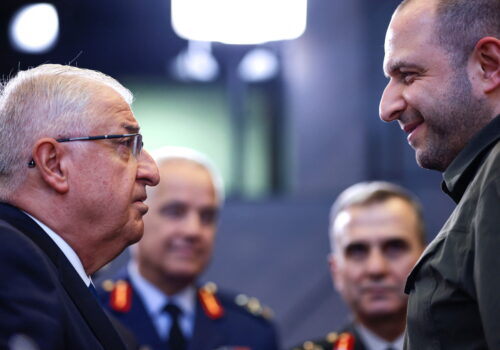For centuries, Ukraine has been Turkey’s northern frontier in its enduring rivalry with Russia for naval dominance. From the Ottoman campaigns against Russia to the Crimean War of the 1850s, control over Ukraine’s southern coast has been critical to limiting Moscow’s ability to project naval power toward the Turkish Straits and beyond.
Today, each successful Ukrainian drone strike against a Russian warship tilts the regional balance further in Turkey’s favor. This convergence of interests makes Ankara and Kyiv natural partners in deterring Moscow, securing safe navigation, protecting critical infrastructure, and reinforcing Europe’s defense against Russia—especially as the United States is considering reducing its military footprint on the continent.
Turkey’s diplomatic efforts amid Russia’s war on Ukraine deserve recognition. Istanbul-hosted talks have helped broker eight large-scale prisoner-of-war exchanges since Russia launched its full-scale invasion in February 2022. Yet, diplomacy alone has produced limited results: the scale of Russia’s aerial attacks on Ukrainian cities continues to break records as Moscow rejects all calls for an unconditional cease-fire. As Moscow stalls for time, Ankara has an opportunity to advance peace by taking concrete steps in three critical areas.
By keeping the Turkish Straits closed, enhancing cooperation with the European Union (EU) to counter maritime hybrid threats, and deepening Ankara’s defense ties with Kyiv, Turkey can help bring lasting peace to Ukraine and ensure stability in the Black Sea.
1. Keep the Straits closed to Russian warships until full withdrawal from occupied territories
In February 2022, invoking the Montreux Convention, Turkey closed the Turkish Straits to Russian warships. This decision helped prevent Russia from conducting amphibious operations against Ukraine’s southern coast. Since then, Ukraine’s successful counterattacks—destroying nearly a third of Russia’s Black Sea Fleet and forcing the rest of its ships to retreat to Novorossiysk—have dramatically shifted the maritime balance of power in the Black Sea in Turkey’s favor.
While the prospect of a sectoral or maritime cease-fire was raised earlier this year, Turkey must resist pressure to reopen the Turkish Straits to the Russian navy. The closure should remain in place until Russia fully withdraws from all occupied Ukrainian, as well as Georgian, territories and territorial waters. Moscow’s ongoing construction of a new naval base in Ochamchire, in the occupied Georgian region of Abkhazia, signals the Kremlin’s intent to keep threatening regional stability with its military buildup. While Ukraine rapidly develops its drone fleet and Turkey completes the construction of corvettes for Ukraine’s conventional navy, Russia’s naval capabilities must be neutralized to secure a lasting peace in the region. Turkey’s diplomatic efforts and Ukraine’s maritime successes have allowed export corridors vital for the global food supply to remain open and reinforced Turkey’s own security posture. This strategic advantage must not be traded away prematurely.
2. Counter Russian gray-zone operations and protect Black Sea infrastructure
While NATO has boosted its efforts to protect undersea infrastructure through initiatives like Operation Baltic Sentry, which the Alliance launched in January, maritime situational awareness in the Black Sea remains critically low. As Serhat Güvenç highlights in a recent Atlantic Council report, Turkish naval and naval air assets provide around 65 percent of the recognized maritime picture in the Black Sea. Experts have long advocated the establishment of a Black Sea fusion center that would facilitate the sharing of sensor data, intelligence, and other relevant information among NATO members, the EU, Ukraine, and Georgia. It would also help coordinate responses to sub-conventional threats, illegal activities, smuggling, and potential military actions, fostering closer collaboration and interoperability among participating countries and organizations.
The EU’s new Black Sea Strategy, released in May, aims to establish a Black Sea Maritime Security Hub to counter maritime hybrid threats. This initiative offers the bloc an opportunity to engage Turkey more closely on maritime security. Closer EU-Turkey cooperation would not only strengthen deterrence against Russia but also help heal political rifts between Brussels and Ankara. As Turkish policy experts Asli Aydıntaşbaş and Mustafa Aydin argued in March, “As Europe faces shifting US policies and the challenge of containing a post-war Russia, renewed cooperation with Turkey is essential. The Black Sea could be the first step.”
The urgency of bolstering Black Sea security is clear. In its Black Sea Strategy, European officials recognize that against a backdrop of Russia “breaching airspace, attacking ports and shipping routes, and laying naval mines,” the Black Sea remains a “prime target” and “Europe’s front line” of Moscow’s hybrid attacks.
Moreover, as Bulgaria and Romania are building infrastructure to extract gas from Black Sea offshore gas fields, it is expected that Moscow will try to disrupt these efforts, as Sofia and Bucharest do not have sufficient naval capabilities to ensure control of the perimeter and deter Russian attacks. Romania’s Neptun Deep, Turkey’s Sakarya, and Bulgaria’s Khan Asparuh gas fields will significantly reduce these countries’ dependence on Russian energy. Yet, these facilities lie in exclusive economic zones (EEZs) outside NATO’s territorial waters and Article 5 protection, making them tempting targets for Russian hybrid tactics.
Fortunately, some international cooperation to deter such threats are already in place, if insufficient to meet the Russian threat. In January 2024, Turkey, Bulgaria, and Romania launched the Black Sea Mine Countermeasures Task Group. The start of joint demining operations in July 2024 marks progress, but the mission’s mandate should go further: It should expand to include patrolling the northern and western Black Sea to safeguard commercial navigation and protect offshore and undersea infrastructure from Russian sabotage and false-flag operations.
Finally, Turkey should cooperate with Ukraine and the EU to expose and disrupt Russia’s shadow fleet—tankers that smuggle the sanctioned oil that fuels Moscow’s war machine. Targeting this network would curb Kremlin revenues, which over the long term can help more quickly bring an end to hostilities a lasting peace in Ukraine.
3. Deepen defense cooperation through drones and innovation
Turkey’s defense partnership with Ukraine has already had a tangible impact on Kyiv’s war effort. Construction of Baykar’s drone production facility near Kyiv is currently underway and is set to produce the Bayraktar TB2 and TB3 drones.
Future cooperation could expand to maritime drones. Ukraine’s homegrown Magura series, used to strike Russian warships and—in a world first—down helicopters and a fighter jet, show the potential of multi-domain naval drones. Magura drones can also be used for surveillance and the protection of critical infrastructure. Scaling up production would help protect Black Sea trade routes and critical infrastructure while offering valuable lessons for Turkey’s own fast-growing drone industry.
Just this month, Turkey, along with Belgium, joined Ukraine’s international drone coalition, aiming to help bolster Kyiv’s defense with cutting-edge unmanned technologies. Such initiatives show the promise of deeper defense-industrial ties that extend beyond Ukraine’s immediate needs and create foundations for a new Black Sea security order.
A shared strategic interest
Ukraine’s defense directly strengthens Turkey’s own security and regional influence. The two countries share a stake in ensuring that Russia is contained, trade continues to flow, and the Black Sea remains stable.
While Moscow continues to reject meaningful peace talks, Turkey can do more than mediate. By keeping the Turkish Straits closed to Russian warships, going after Moscow’s shadow fleet, leading efforts to protect critical maritime infrastructure, and deepening defense cooperation with Ukraine and NATO allies, Ankara can bring lasting stability to the Black Sea, strengthen Ukraine’s strategic position, and secure its own long-term interests in the region.
Yevgeniya Gaber is a nonresident senior fellow at the Atlantic Council Turkey Programs. Follow her on X @GaberYevgeniya.
The views expressed here are the author’s own and do not represent the official positions of the Atlantic Council or any other institution or government.
Further reading
Wed, Mar 12, 2025
Now more than ever, the United States needs a Black Sea strategy
TURKEYSource By Arnold C. Dupuy
Peace and prosperity in the Black Sea will require more than a cease-fire in Ukraine; it will require a new Black Sea security and development strategy.
Wed, Nov 13, 2024
Quiet before the storm: Is a new maritime security order taking shape in the Black Sea region?
TURKEYSource By
While Turkey and Europe have their own maritime strategies for the Black Sea, finding ways of cooperation is critical to counter Russia's maritime power.
Wed, Aug 28, 2024
Turkey wants to end the war in Ukraine—and might have a formula to do it
TURKEYSource By Rich Outzen
Turkey would play a role in a cease-fire and post-war arrangement, drawing on a history of balance and deterrence in the Black Sea region.
Image: Turkish Foreign Minister Hakan Fidan, meets with Ukrainian Defense Minister, Rustem Umarov in Kyiv on May 30, 2025. Photo by Turkiye Ministry of Foreign Affairs office via Reuters Connect.



